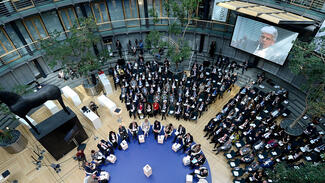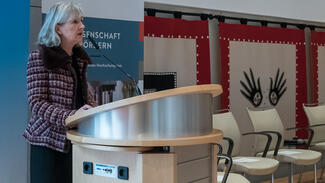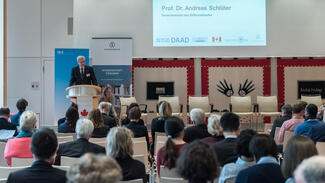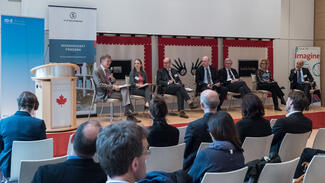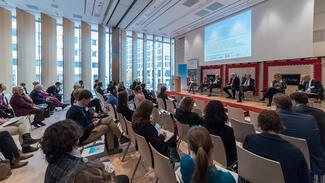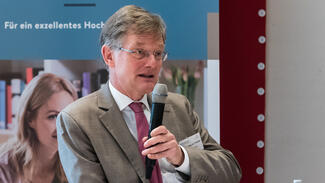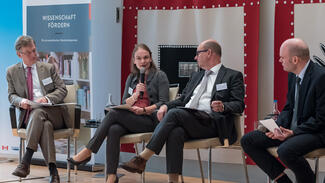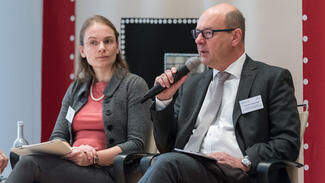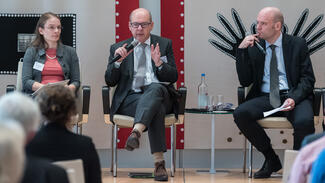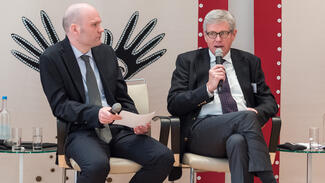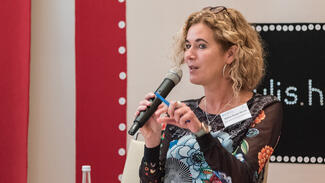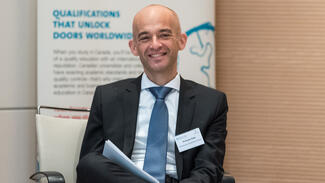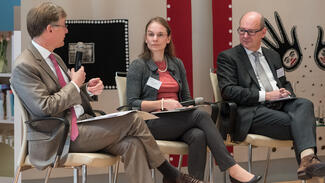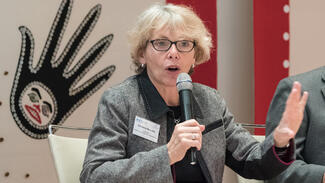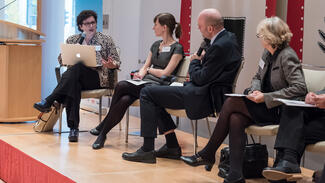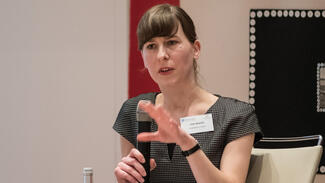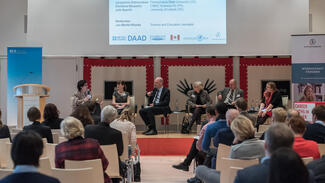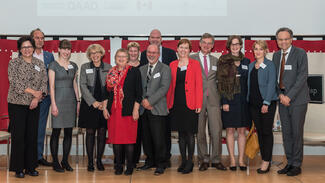Die Veranstaltungsreihe "International Dialogue on Education" (ID-E) ist eine Gemeinschaftsinitiative des British Council, des Deutschen Akademischen Austauschdienstes (DAAD), der Deutsch-Amerikanischen Fulbright-Kommission, der Botschaft von Kanada und der Freien Universität Berlin. Durch die Beiträge der Teilnehmer aus dem In- und Ausland will die Veranstaltung die Debatte über Wissenschaft, Forschung und akademische Bildung in Deutschland bereichern, die deutsche Perspektive in einen globalen Kontext rücken und Gelegenheit geben, von positiven Beispielen aus dem Ausland zu lernen.
The series "International Dialogue on Education" (ID-E) is a joint initiative of the British Council, the German Academic Exchange Service (DAAD), the German-American Fulbright Commission, the Embassy of Canada in Germany and Freie Universität Berlin. Through the contributions of international participants the series aims to enrich the debate on science, research and higher education policy in Germany, to place German perspectives in a global context and to learn from positive examples from other countries.
7. November 2016, 10:30 bis 20:00 Uhr
Botschaft von Kanada, Leipziger Platz 17, 10117 Berlin
Session 1
in deutscher Sprache
Wie wird man [HAW- oder Uni-] Professor/in?
Neue Formen von Karrierewegen zur Professur in Deutschland
10:30 Uhr
Begrüßung und Einführung
I.E. Marie Gervais-Vidricaire, Botschafterin von Kanada in Deutschland
Prof. Dr. Andreas Schlüter, Generalsekretär, Stifterverband
10:45 Uhr
Impuls 1: Wege zur Universitäts-Professur
Prof. Dr. Ernst-Ludwig von Thadden, Rektor, Universität Mannheim
Impuls 2: Wege zur HAW-Professur
Prof. Dr. Andreas Zaby, Präsident, Hochschule für Wirtschaft und Recht Berlin, Vorsitzender des Hochschulverbundes UAS7
11:15 Uhr
Paneldiskussion
Prof. Dr. Ernst Ludwig von Thadden, Rektor, Universität Mannheim
Prof. Dr. Andreas Zaby, Präsident, Hochschule für Wirtschaft und Recht Berlin, Vorsitzender des Hochschulverbundes UAS7
Dr. Anna Tschaut, Bundesvorsitzende, THESIS – Interdisziplinäres Netzwerk für Promovierende und Promovierte e.V.
Dr. Thomas Grünewald, Staatssekretär im Ministerium für Innovation, Wissenschaft und Forschung des Landes Nordrhein-Westfalen
Prof. Dr. Bettina Burger-Menzel, Mitglied der AG Karriereziele und -wege an Fachhochschulen, Wissenschaftsrat und Professorin für Wettbewerbs- und Strukturpolitik, Technische Hochschule Brandenburg
Prof. Dr. Andreas Schlüter, Generalsekretär, Stifterverband
Moderation: Jan-Martin Wiarda, Wissenschaftsjournalist
- Wie kann man das Karriereziel Professur (wieder) attraktiv für den wissenschaftlichen Nachwuchs machen? (Jüngste Ergebnisse empirischer Erhebungen zeigen, dass die Mehrheit des wissenschaftlichen Nachwuchses nicht mehr in der akademischen Wissenschaft verbleiben will.)
- Inwieweit sind die Rekrutierungsstrategien der Wissenschaftseinrichtungen darauf eingestellt, was eine Karriere innerhalb/außerhalb der Wissenschaft für den wissenschaftlichen Nachwuchs attraktiv macht? Sollte es ein Ziel sein, die aussichtsreichsten Kandidaten bis zur Berufungsfähigkeit im Wissenschaftssystem zu halten, oder soll man sie ziehen lassen und dann versuchen zurückzugewinnen?
- Wie lassen sich Karrierewege in die Wirtschaft und zurück in die Wissenschaft etablieren? Wie passen die Karrierepfade in Unternehmen dazu?
- Soll es für grundsätzlich berufungsfähige Kandidaten, denen die Berufspraxiserfahrung für eine HAW-Professur fehlt, spezielle Programme geben? (Es gibt Berichte über Schwierigkeiten vieler HAW, geeignete Kandidaten zu finden; gleichzeitig haben wir seit Jahren durchschnittlich etwa zehn- bis zwanzigmal so viele neu Promovierte jährlich wie pro Jahr neu berufen werden.)
- (Wie) Kann oder soll die Durchlässigkeit zwischen den Sektoren Wissenschaft und Wirtschaft verbessert werden?
12:45 Uhr
Mittagessen
Session 2
in englischer Sprache
How to become a professor?
Career Paths in Higher Education
13:45 Uhr
Welcome and Opening Remarks
Ulrich Grothus, Deputy Secretary General, German Academic Exchange Service (DAAD)
14:00 Uhr
Panel discussion – part one
Léo Charbonneau, Senior Editor, University Affairs, Universities Canada (Canada)
Jacqueline Edmondson, Associate Vice President and Associate Dean, Undergraduate Education, Pennsylvania State University (USA)
Christine Musselin, CNRS Senior Research, Centre de Sociologie des Organisations, SciencePo (France)
Rosemary Deem, Vice Principal (Education) & Dean of the Doctoral School, Professor of Higher Education Management, Royal Holloway University of London (UK)
Jule Specht, Junior Professor for Personality Psychology and Psychological Assessment, Freie Universität Berlin (Germany)
Chair: Jan-Martin Wiarda, Science and Education Journalist
16:00 Uhr
Coffee
16:30 Uhr
Panel discussion – part two
18:00 Uhr
Reception and Buffet
20:00 Uhr
End of Event
The thirteenth conference in the ID-E Berlin series will focus on typical – and exceptional – career tracks for academics within different higher education systems. The discussions will address the following topics and questions:
1) Comparison of systems: professorship and academic careers at higher education institutions in the USA, in Canada, the United Kingdom, France and Germany
- What does the tenure-track system/career structure look like in different countries? In each respective system of higher education, which one is the normal way to professorship, meaning the way to a permanent position in which one can practice research independently? How is this "target position" designed and equipped? How many professorial positions and tenure-track positions are there (also compared to PhD students and postdocs)?
- Which preliminary and intermediate stages does the system offer in this regard? Which promotion opportunities and diverse job profiles are there for the academic personnel?
- When and how will the decisions for an admission or a promotion of (or even a departure from) the academic/research career be made? Which mechanisms of assistance, consultation and support are included in the system?
2) Challenges
- Drop out: What happens to people whose career does not end in an independent, permanent position? How should we deal with young researchers who do not qualify for a career after their PhD/Postdoc, fail at an early stage or are frustrated because they are occupying indefinitely a non-independent position, whether permanent or temporary?
- Quantitative proportion: How can the ratio between the contender for an academic career (PhD students, postdocs) and the insecure positions be regulated and influenced? What are the greatest challenges for the university in managing the expectations of PhD students, and how can the university do a better job of informing PhD students about career planning and providing them with opportunities?
- How does the higher education system prepare its young academics and scientists for alternative career paths inside the higher education institution (management, non-independent positions) or outside in the economy? What options for career paths in higher education exist, both inside and out of the faculty? How do economy and industry recruit their researchers and scientists? Can universities compete with industry in terms of career opportunities?
3) Outlook and political framework
- How can the individual career path to a professorship/independent permanent position be designed in a more rational and transparent way? Which kind of strategic, structural and staff-related concepts are there – within each institution and in higher education policies?
- How can the university, government and other stakeholders ensure that the best find their way into academia? What do universities look for in an ideal faculty member?
- How does the personnel policy have to be in order to attract young international academics for a scientific career in a country?
- Drawing on examples from their own education systems and institutions, a detailed understanding of the different challenges and new developments in HE career paths and personnel development will be elicited from our experts from the United Kingdom, Canada, the United States of America, France, and Germany.
